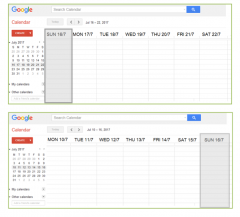Time Perception
Time is ubiquitous in our lives, and we often use a calendar, a watch, a day planner without considering that these are visual manifestations of an underlying abstract construct – time. One ongoing research program in the Life Tools Lab aims to examine time representation as an everyday tool affecting how people think about and plan their lives.
Calendars
Some of our recent work showed that using a calendar that starts on the current day increased people’s motivation to work on their personal goals.Consider the two calendars below – one shows the week starting on Sunday , one shows the same week starting on Monday. We found that when asking people how motivated they are to work towards personal goals on Sunday, they were more motivated after contemplating the first calendar that started on Sunday than if they contemplated the second calendar, where Sunday was placed at the end of the week. The way time is represented can signal psychological associations such as “it’s a fresh start!” and affect our motivation.

Davydenko, M. & Peetz, J. (2019). Does it matter if a week starts on Monday or Sunday?: How calendar format can motivate goal motivation in the moment. Journal of Experimental Social Psychology, 82, 231-237.
Temporal Landmarks
Temporal landmarks may be one tool structuring our lives. Much as physical landmarks help structure our representation of space (“turn right at the church!”), temporal landmarks such as birthdays and significant calendar dates structure our perception of time. When using a calendar or when thinking about their future, people may organize time by these markers (“before my birthday – after my birthday”). We examine how such landmarks can affect goal motivation and goal pursuit. An event falling after a landmark might seem a lot closer once the landmark has passed than when the landmark is still separating the current self from that future event.
Peetz, J., & Wilson, A. (2013). The post-birthday world: Motivational and self-appraisal consequences of temporal landmarks. Journal of Personality and Social Psychology, 104, 249-267.
Other research on time perception from our lab
Yongzhen, X., & Peetz, J. (accepted). Effects of Nature Soundscape on Mood, Stress, and Time Perception. Preregistered report accepted at Collabra: Psychology, data collection pending.
Peetz, J., Milyavskaya, M., & Davydenko, M. (2020). When time on task is seen as a reward: Autonomous motivation increases preference for pursuing goals more often for less time. Collabra: Psychology, 6(1), 13.
Davydenko, M. & Peetz, J. (2019). Does it matter if a week starts on Monday or Sunday?: How calendar format can motivate goal motivation in the moment. Journal of Experimental Social Psychology, 82, 231-237.
Peetz, J., & Wohl, M. J. (2019). Perceiving time through group‐based glasses: Collective temporal orientation. British Journal of Social Psychology, 58(3), 609-629.
Davydenko, M., & Peetz, J. (2017). Time grows on trees: The effect of nature settings on time perception. Journal of Environmental Psychology, 54, 20-26.
Leduc-Cummings, I., Milyavskaya, M, & Peetz, J. (2017). Goal motivation and the subjective perception of past and future obstacles. Personality and Individual Differences, 109, 160-165.
Peetz, J. & Epstude, K. (2016). Calendars matter: Temporal categories affect cognition about future time periods. Social Cognition, 34(4), 1-17.
Peetz, J., & Wilson, A. E. (2014). Marking Time. Selective use of temporal landmarks as barriers between current and future selves. Personality and Social Psychology Bulletin, 40, 44-56.
Peetz, J., Jordan, C. & Wilson, A. E. (2013). Implicit attitudes toward the self over time. Self and Identity, 13, 100-127.
Corcoran, K., & Peetz, J. (2013). Looking towards the past or the future: How regulatory focus affects temporal comparisons and subsequent motivation. Self and Identity, 13, 81-99.
Peetz, J., & Wilson, A. (2013). The post-birthday world: Motivational and self-appraisal consequences of temporal landmarks. Journal of Personality and Social Psychology, 104, 249-267.
Conway, P., & Peetz, J. (2012). When does feeling moral actually make you a better person? Conceptual abstraction moderates whether past moral deeds motivate consistency or compensatory behavior. Personality and Social Psychology Bulletin, 6, 907-919. Winner of the SPSP Student Publication Award 2013.
Caouette, J., Wohl, M. A., & Peetz, J. (2012). The influence of time on collective guilt: Future harm weighs heavier than harm already committed. European Journal of Social Psychology, 42, 363-371.
Epstude, K., & Peetz, J. (2012). Mental Time Travel: A conceptual overview of social psychological perspectives on a fundamental human capacity. Special Issue, European Journal of Social Psychology, 42, 269-275.
Peetz, J., & Buehler, R. (2012). When distance pays off: The role of construal level in spending predictions. Journal of Experimental Social Psychology, 48, 395-398.
Peetz, J., Buehler, R., & Britten, K. (2011). Only minutes-a-day: Reframing exercise duration affects exercise intention and behavior. Basic and Applied Social Psychology, 33, 118-127.
Peetz, J., Buehler, R., & Wilson, A. E. (2010). Planning for the near and distant future: How does temporal distance affect task completion predictions? Journal of Experimental Social Psychology, 46, 709-720.
Buehler, R., Griffin, D., & Peetz, J. (2010). The planning fallacy: Cognitive, motivational, and social origins. Advances in Experimental Social Psychology, 43, 1-58.
Peetz, J., Gunn, G., & Wilson, A. E. (2010). Crimes of the past: Defensive temporal distancing in the face of past in-group wrongdoing. Personality and Social Psychology Bulletin, 36, 598-611.
Buehler, R., Peetz, J., & Griffin, D. (2010). Finishing on time: When do predictions influence completion times? Organizational Behavior and Human Decision Processes, 111, 23-32.
Peetz, J., Wilson, A. E., & Strahan, E. J. (2009). So far away: The role of subjective temporal distance to future goals in motivation and behavior. Social Cognition, 27, 475-496.
Peetz, J., & Wilson, A. E. (2008). The temporally extended self: The relation of past and future selves to current identity, motivation, and goal pursuit. Social and Personality Psychology Compass, 2, 2090-2106.
